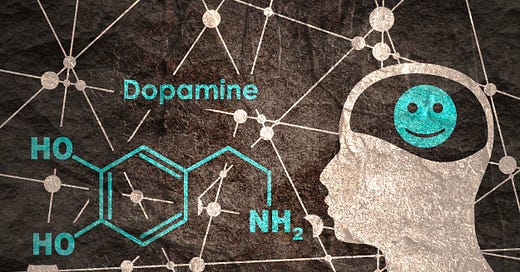Dopamine was first considered the brain’s reward molecule with some ground-breaking research at the time. Over the years this has increasingly been questioned with dopamine then taking a key role in motivation, but even more recent research has added even more nuance to dopamine’s role.
Dopamine has moved into the lay vocabulary with the concept of a “dopamine fast” coming out of Silicon Valley. This is because the standard description of the addictive effects of social media is that each small piece of new information or “like” creates a small spike in dopamine - a small reward that keeps us hooked and looking for that next small hit. There is a lot of truth in this simple model. And these constant spikes of dopamine are, seemingly, what are getting us addicted to social media - unable to withdraw from those constant small rewards. Therefore, a “dopamine fast” is needed whereby we withdraw from social media and just go through life without those small spikes of dopamine constantly pulling us along and disrupting what would be otherwise productive days.
I find the term both useful and ridiculous. Useful as a concept because it does allow us to be more conscious in what we engage in, and how we use our attention. Ridiculous because there is no such thing as a dopamine fast – the brain produces dopamine constantly. Dopamine is one of the best-known neuro-messengers and is also well researched. Its roles include attention, motivation, and reward, and its disfunction is related to autism, ADHD, addiction, and much more. So, all in, pretty important to us as human beings and as a society.
So, let’s review dopamine:
Keep reading with a 7-day free trial
Subscribe to leading brains Review to keep reading this post and get 7 days of free access to the full post archives.




